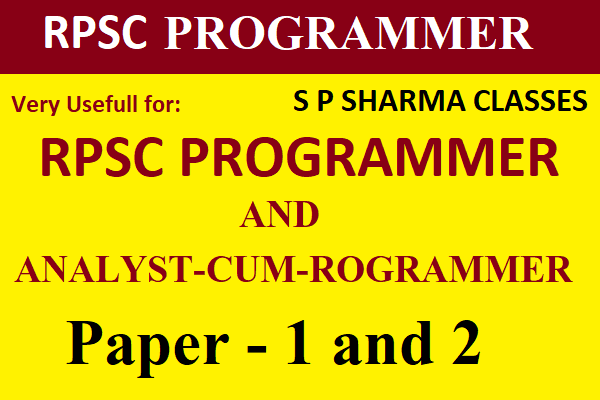There are no items in your cart
Add More
Add More
| Item Details | Price | ||
|---|---|---|---|
RPSC Computer Programmer, System Analyst cum Programmer
5.0 (3 ratings)
596 learners enrolled
Language: Hindi + English
Instructors: S P SHARMA SIR
Why this course?
SYLLABUS FOR RPSC PROGRAMMER AND ANALYST-CUM-PROGRAMMER
Paper – I
Reasoning Test & Numerical Analysis & General Knowledge
Problem solving, Data Interpretation, Data Sufficiency, Logical Reasoning and Analytical Reasoning. General Knowledge and Current Affairs relating to India and Rajasthan
Data Base Management Systems
ER Diagram, data models- Relational and Object Oriented databases. Data Base Design: Conceptual data base design, Normalization Primitive and Composite data types, concept of physical and logical databases, data abstraction and data independence, data aggregation and Relational Algebra. Application Development using SQL: Host Language interface, embedded SQL programming, Stored procedures and triggers and views, Constraints assertions. Internal of RDBMS: Physical data organisation in sequential, indexed random and hashed files. Inverted and multilist structures, B trees, B+ trees, Query Optimisation, Join algorithm. Transaction Processing, concurrency control and recovery management. Transaction model properties and state serialisability. Lock base protocols, two phase locking. Different server multi user, multiprocess operating systems and requirement for client interfaces in distributed application environments.
Data Communication and Computer Networks
Computer Network Architecture, Circuit switching, Packet And Massage Switching, Network Structure. Physical Layer, Data Link Layer, Framing. Retransmission algorithms. Multiple access and Aloha. CSMA/CD and Ethernet. High Speed LANs and topologies. Broadcast routing and spanning trees. TCP/IP Stack. IP Networks and Internet. DNS and Firewalls. Intrusion Detection and Prevention. Transport layer and TCP/IP. Network Management And Interoperability.
Paper – II
System Analysis and Design System concept:
Definition and characteristics, elements and boundaries, types of system development lifecycle, recognition of needs, feasibility study, prototyping, role of system analyst. System planning and tools like DFD, data dictionary, decision trees, structured analysis and decision tables. IPO charts, structured walkthrough, input output form design, requirement and classification of forms, layout considerations form control, object oriented Design Concepts and methods. Software Life Cycle, Software Engineering paradigms. System analysis: Feasibility study requirement analysis, Cost benefit analysis, Planning systems, Analysis tools and techniques. System Design: design fundamentals, Modular Design, Data and procedural design, object oriented design. System Development: Code documentation, Program design paradigms, Efficiency Consideration. Verification, Validation and Testing: testing methods, Formal Program Verification, Testing Strategies. Software Maintenance: Maintenance Characteristics, Maintainability, Maintenance tasks and side effects.
Software Project Management (Analyst)
Software Project Management Concept: The Management Spectrum, People, Product, Process & Project. Software Process & Project Matrix: Software Measurement Size Oriented Matrixes, Function Oriented Matrices. Software Project Planning: Objectives, Decomposition Techniques, Empirical Estimation Model. Risk Analysis and Management: Risk Identification, Projection, Risk Refinement, Risk Monitoring And Management. Project Scheduling & Tracking, Software Quality Assurance, Software Configuration Management.
Programming Concepts Introduction (Programmer):
Internet, Java as a tool for internet applications, Byte Code and its advantages. Object Oriented Programming and Design: Review of Abstraction, Objects and other basics, Encapsulation, Information hiding, Method, Signature, Classes and Instances, Polymorphism, Inheritance, Exceptions and Exception Handling with reference to object modeling, Coupling and Cohesion in object oriented software. Object Oriented Design – Process, Exploration and Analysis. Java Programming Basics: Variables and assignments, Input and Output, Data Types and Expressions, Flow of control, Local variables, Overloading Parameter passing, this pointer, Java Object Oriented Concepts: Use of file for I/O, Formatting output with stream functions, Character I/O, Inheritance, Public and private members, Constructors for initializations, Derived classes, Flow of Control Arrays-Programming with arrays, arrays of classes, arrays as function arguments, Strings, Multidimensional arrays, Arrays of strings, vectors, Base classes. Introduction to JSP, RMI, Java Applets and servlets. Introduction to DotNet framework and visual programming interface.
After a successful purchase, this item will be added to your courses.
You can access your courses in the following ways :
